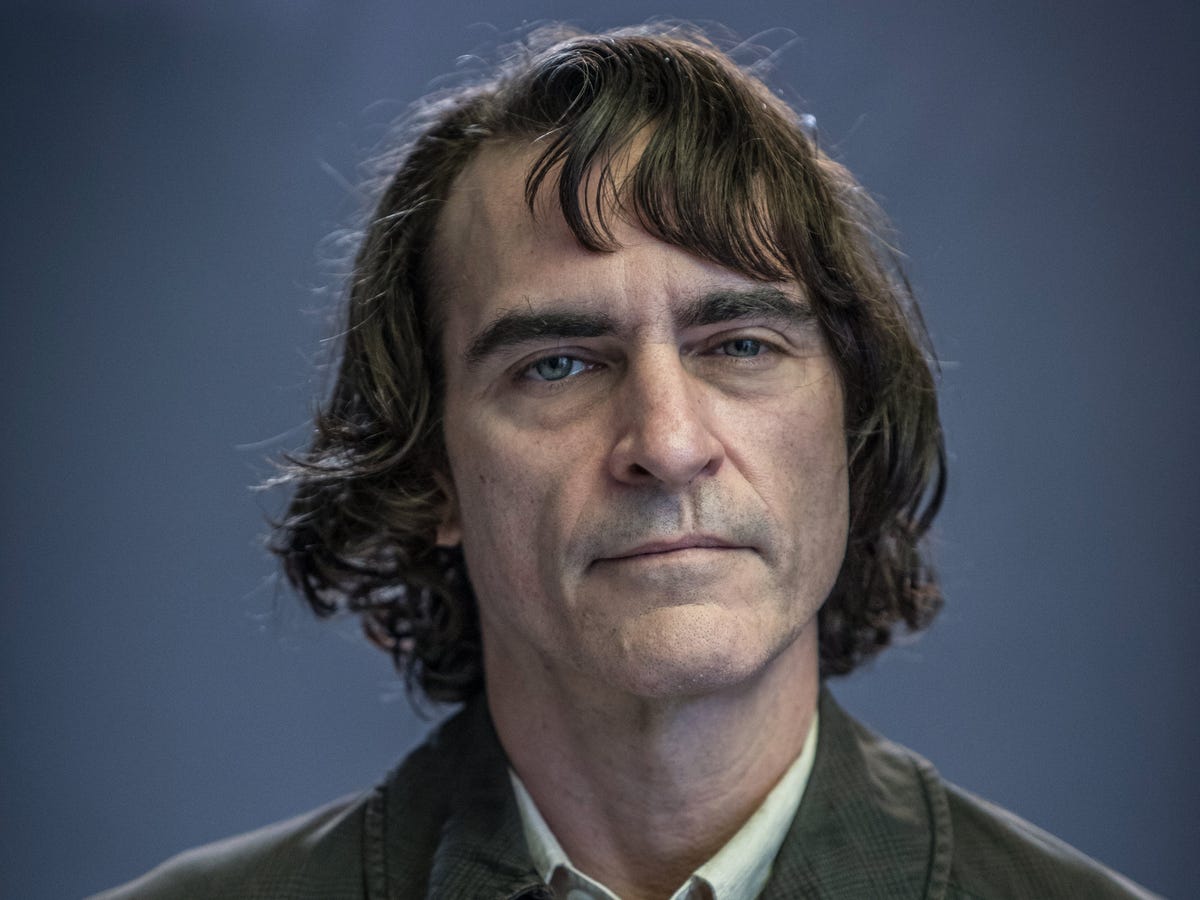Stunning – [ stuhn-ing ] – adjective:
1. causing, capable of causing, or liable to cause astonishment, bewilderment, or a loss of consciousness or strength:a stunning blow.
2. of striking beauty or excellence:What a stunning dress you’re wearing!
The movie Joker. Woah. I’m a little dizzy, having just walked out of the theater. Reality seems too subdued, and yet too loud at the same time. It’s like the real world just annihilated the clutch on my mind. I am simultaneously exhilarated and appalled by this movie. What just happened? And in the world of THiNC. that is the definition of a brilliant movie. It could be stunningly appalling – it could be stunningly impressive. But when it is simultaneously stunningly and jarringly good while being stunningly/jarringly amoral you know you have a conversation starter on your hand. Now this is something that we can have a real conversation about.
First though – The Joker is a movie I think everyone should see. Well, everyone that finds themselves on this page anyway. (Funny side story, my father-in-law hung out the other day, and he was telling me about a few movies that he loved. We talked about them for a while, and then he was like, “What movies can you recommend for me to watch.” “Sorry Opa, I don’t have anything to recommend. Just can’t really think of anything.” “But you watch movies all the time. You have that site thing!” “Yeah, but I don’t think I have any I can recommend to you!” He eventually got me to recommend The Sound of Silence, so everyone can calm down. But it made me laugh.) So, yes, if you are here on this site, and you like complicated movies, I’m recommending Joker to you. Because Joker is a sign of the times. It’s a moral temerity test. You may not love it, heck, you might hate it…but it is a movie that will be a moral litmus test for where you stand among society today. It’s a really über-fascinating movie.
Batman’s Cutting Edge
I’ve been a Batman fan since I was first aware there was a bat. And I haven’t wandered from the stories about Bruce Wayne and his heroism because it is a real man trying his best to counter the forces of evil that are all around him. It’s about an individual making sense of senseless tragedies of his parents’ murders. It’s about a broken individual trying to put the pieces back together and move on. Now that? That’s a story that I can relate to. And better yet, the art of the Batman books are historically some of the best the comic world have ever produced (Manga aside, yes, Akira, Appleseed, etc etc – I was a legit comic fan. I have my legit fanboy cards – they are all still intact.) But look at this page from one of the greatest comics ever published, Arkham Asylum. This page shows Batman (not Bruce) being given a Rorschach test inside Arkham, where we are very nervous the bat will go insane while trying to save the inmates from the Joker.
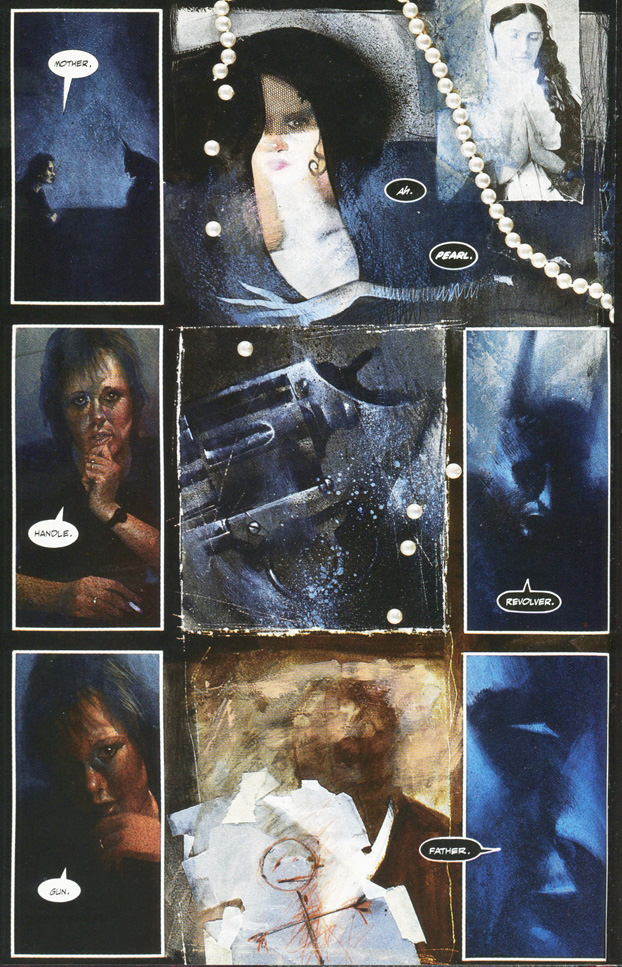
And this insanity was written, drawn, and published in 1989 people. Which, coincidentally, was the same year that Michael Keaton’s Batman was released. But compared to the movie, this comic book is rocket fuel compared to a damp match. So the comic book has always had, deep within its bowels, a desire to disturb, and move people to emote and to think. And it’s funny, because I assumed Tim Burton’s Batman was dark and cutting edge. Studio execs worried that it might be too dark for the time. And some decried it as abhorrently amoral. Hahahahahaha. That’s all I have to say to that. The Joker put that discussion to bed, for sure.

Quick Joker Walkthrough
Normally, in order to get us all on the same page, I walk through the movie in detail, in order to get us all on the same page. It aligns us all before we start tearing it down and pulling apart the pieces in order to figure out how it all works. But today I’m only going to give the movie a cursory walkthrough so that we can get quicker to the moral/intellectual deconstruction/demolitioning that needs to be done here. The true heavily lifting.
The Joker is a re-imagined origin story for the infamous Batman-foil that is firmly embedded within the world of 1981 Gotham. In the books, Joker was generally created by falling into a vat of acid, and he sort of moved from buffoonery silliness to darkest character in all of the comic universe. I mean, the Joker murdered Jason Todd (the second Robin) as well as paralyzing Barbara Gordon. But, in this version of the Joker’s birth, there is no acid. Instead there are mental health issues, piles of medication, and a society that is cutting back on the social welfare that is the very thin thread that is keeping him from falling into darkness. Simultaneously, Gotham is angry at the rich of the city, the people who are abusing the poor, and stealing from the social programs that barely holding the town together.
There are two key threads to The Joker (played by Joaquin Phoenix) that I need to unpack. The first is his relationship with the woman and her daughter who live in the same building with him and his mother. Surprisingly, the two begin hanging out, and she is a startlingly beautiful ray of sunshine in this otherwise bleak movie. She’s there for him at his standup routine, she’s there for him after his mother falls ill. She is a rock to this emotionally unstable individual. Except, we learn towards the end that this relationship actually doesn’t happen. Arthur has made up 100% of it.
The second thread is the fact that Arthur is adopted. Or is he? Arthur’s mother maintains that Bruce Wayne is actually the father of her son whom she raised on her own after working at the estate. In order to learn more about his mother and her stay at Arkham, Arthur heads into the asylum and steals his mother’s records. But even after obtaining the records it’s unclear as to whether or not Penny Fleck truly did go mad, or if Thomas Wayne (Bruce’s father for the uninitiated) used his money to send her to Arkham to cover up his infidelity. But it creates a very interesting duality within the world of Gotham between Batman and the Joker…both from the same father?
And as the Joker heads towards it inevitable train wreck ending, we watch as Arthur’s prescriptions are turned off, his social worker is fired, and he is laughed off the stage at a local stand up attempt. The city is already a tinder box, and the Joker manipulates the passions of the city to turn it in on itself. Which brings us to our riotous conclusion…”You are laughing, what are you laughing about?” “Awww you wouldn’t get it.” Which, is a great summation of the entirety of what Joker learns throughout the course of this movie.
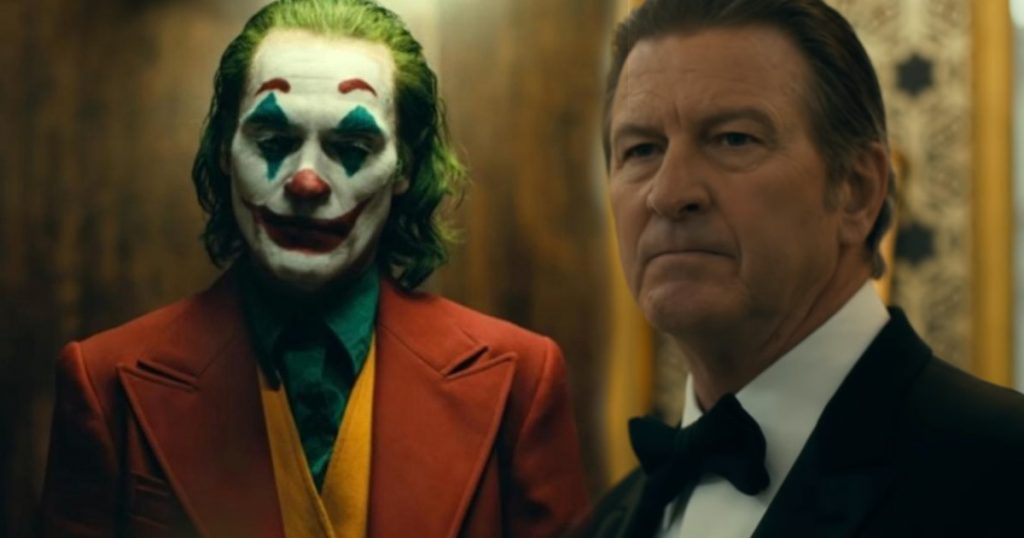
The Joker Movie Dismantled
Much has been made of the movie’s “hero” and his use of senseless violence. The Aurora Colorado shootings at a Batman showing have been invoked. The Las Vegas shootings. Much hay has been made about this movie. But at the heart of it, we like our violence to come with a righteous justice – not a mindless and vile evil about it. But think about it, are either OK in real life? You kill my dog. And my wife. My family. Whatever. And if I were to hunt you, and your family, and your dog down, and then murder you with great panache and ballet-esque vengeance, well, in the real world, I would go to prison for a very long time for that. No question. So, now that we have a movie about a realistic portrayal of The Joker, who kills indiscriminately, I’m not 100% clear what all the gnashing of teeth is coming from.
Actually I do. Within the movie world, we have crafted a logic of judgement that is finely tuned and specifically constructed to allow our heroes to murder with impunity. For example, Bruce Willis, in Die Hard…he is our White Hat Hero. He is the every man who is both just trying to survive the chaos of the experience. But if he follows the rules of the moral dilemma at hand, we forgive him his sins at the end of the story. And we all sort of just understand the general rules of these “engagements.” No cold blooded murder. Allow for surrender. And it should be for a good reason. Etc. etc.
But did you know this idea actually comes from philosophy? Specifically the philosophical ideal of the Just War Theory? Great thinkers of the last few thousand years considered this question very seriously. The first tenet of just war theory is that it should be waged by the proper institution – one that represents the common good. (And who represents the common good better than John McClane?) The second is that it must be for a just purpose rather than for self-gain. Is McClane trying to get his fair share of the German Bearer Bonds? No. He’s not. He’s trying to reunite with his wife, and save the lives of the hostages. And thirdly, peace must be the end goal. I mean, even in the midst of blood soaked madness, the heroes has to be fighting for the ultimate purpose of peace.
So, when Joker walks onto the scene, and shoots a Wayne executive in the head, another in the chest, and then executes another as he tries to crawl away, he happens to be breaking all three Just War tenets in one fell swoop. As a society, we decided we wanted our heroes to be our better selves. To strive for goodness. To strive for peace, and the cessation of hostilities. To do everything in order to restore order (Die Hard), even if it means horrific violence (Rambo), it needs to do so in an effort to restore society (Mission Impossible) to a better place than before the hostilities began (Zombieland – OK, maybe not that one).
But why is it that we would like our fiction to follow these rules and mores? Why do we care at all how we prefer our entertainments? Wait – you do believe me about these rules, right? If you don’t, just consider this thought experiment about a movie about an anti-hero who is a serial puppy killer. He’s stalking the inhabitants of – what, Boston? – and strangling their puppies as the world sleeps. We learn about his family, and his medications, his trauma as a child. Yeah, no. That would not be a well received movie. Not even a little bit. But why is that – is it because these social (I would say they aren’t social ideas – but rather ideas of morality) ideals are hardwired into us?
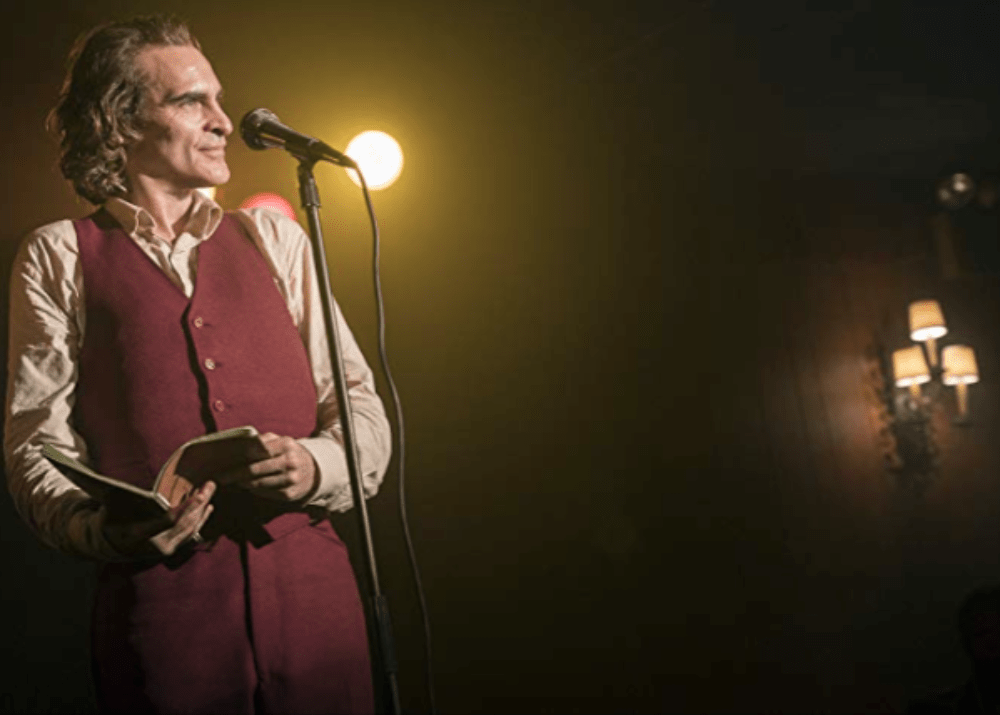
The Movie Joker Is Stunning in Every Way
An interesting change in Joker was its explanation for how he became the monster he becomes. Christopher Nolan eschewed explanations or rationalizations for his Joker. We watched as Heath Ledger wrote and rewrote and re-rewrote his origin story until all that we were certain of was that Nolan’s Joker was lying to us. Todd Phillips on the other hand, marinates Arthur Fleck in terribly clear narrative explanations for Joker’s Hitleresque conscience, or lack there of. We learn that Penny, Arthur’s mother allowed his step-father to tie him to a radiator and beat him. We learn that the abuse started early, and that it didn’t stop. We learn that Arthur spent several stints inside Arkham, as did his mother. The script tells us about his struggle to mainstream after leaving the asylum. And when Arthur learns that the social services office is closing, he hears, “They don’t give a shit about people like you Arthur. And they don’t give a shit about people like me either.” It’s a society that coddles the rich, and sticks it to the poor. And it is in the midst of this turmoil between the hoi polloi, and the rich, that the clowns rise up.
The movie’s firm grounding in reality truly gives me pause. Minus the 80’s throwback art direction, this movie could be set today under Trump. (No no – I’m not getting political. Just saying that the backstory is relevant.) Gotham is a powder keg that re-invisions the Wayne’s as the cause of the problem, not the solution. And in this universe, Batman will solely be cleaning up a mess that he alone has created. Which, I have to say, that I would adore seeing Bruce and Arthur going head to head in a gritty world of this sort of making. I can’t even imagine it. Nolan’s Gotham universe makes sense. But what about two hyperreal characters that end up lighting the world on fire? That would be a mind blowing experience.
But what does the end of this Joker say about the world we live in today? What is it communicating? When Joaquin Phoenix was asked if Joker would inspire more mass murders, he walked off the set. But absent a comment on our societies penchant for guns, and murder…I see a few possibilities. Some of the most obvious are that we are designing and creating our own arch-nemeses out of our abuse of the common everyday people who don’t have a safety net to fall into. Something like that anyway. But that just smacks of laziness in my book. Sure. “Don’t Take Meds From The Infirm!” could be the movie’s slogan.
I spent a long time talking through the rules of movies in general, just so I could circle back here and say this. We expect our superheroes (including Die Hard, and the like) to follow our Just War ideals. That, though, is not exactly the case for other movies. Like, for example the movie The Killing of a Sacred Deer. It looks at these Just War ideals and giggles. Well – then, what exactly is Sacred Deer doing then? I would argue that it is actually a story of about a Faustian Bargain. A deal with the devil. Or more simply put, it is maybe a modern Fable. A story that exists in order to tell a deeper meaning, or moral. Would it be possible to flip the script on the movie Joker, and to see it less as a superhero movie, and actually more as a cautionary tale in the form of a fable? Could it be a moral that warns us of our rapid decline and chaos that is coming our way if we don’t avert disaster somehow? Or, better yet, maybe it isn’t telling us anything at all. Maybe Joker is just a mirror held closely to our faces. Fog glistening across the surface of our reflection and gape. As Joker pulls out his gun and blows Murray Franklin’s (Robert De Niro) head off, we realize just how horrifying our visage has truly become.
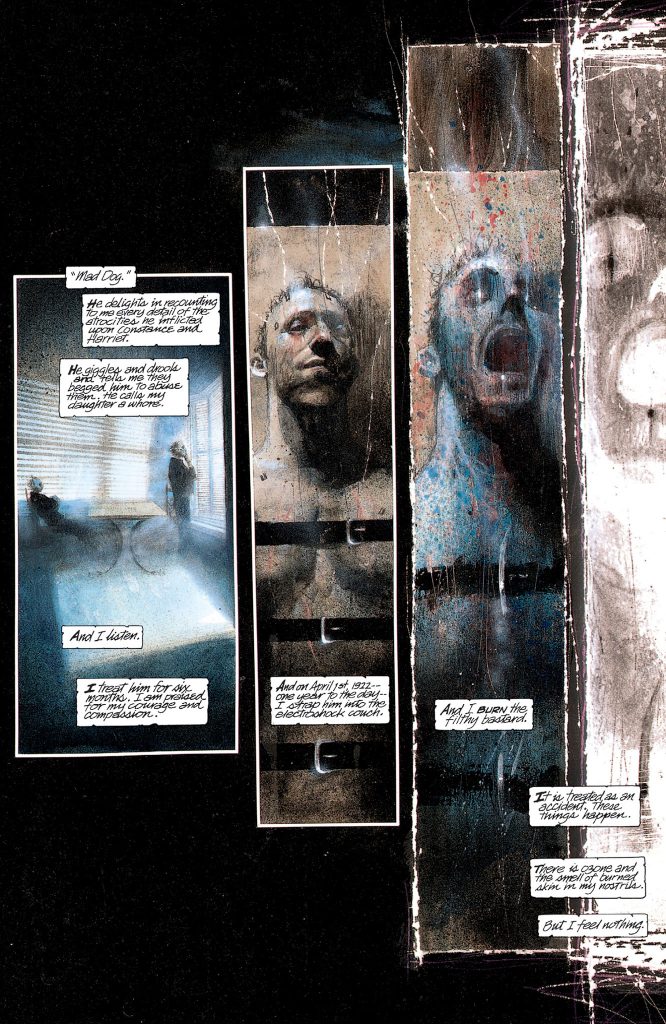
Edited by: CY

